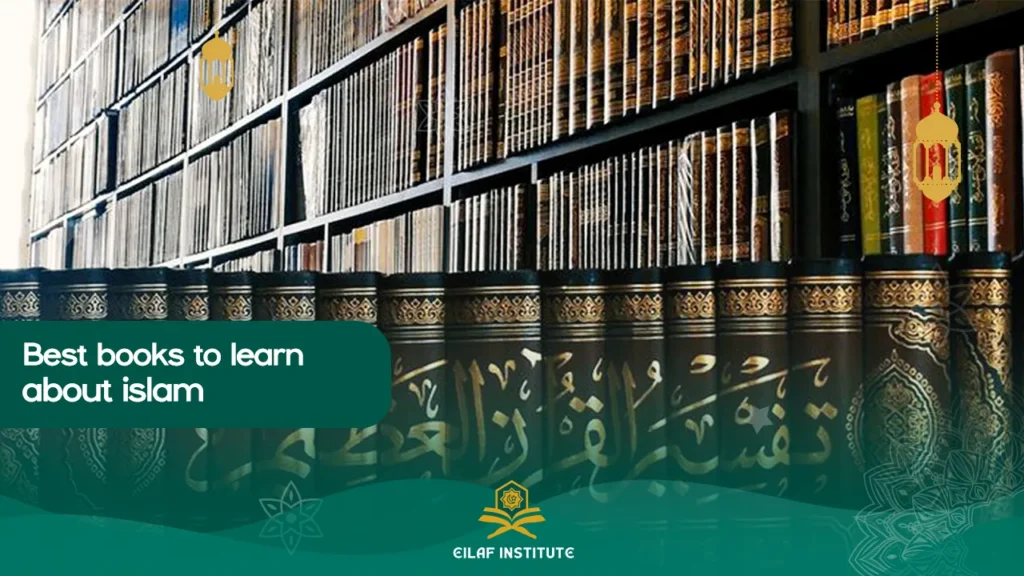There are many books that new Muslims and the Muslims that want to know more about the Islamic religion can read. In this article, we will provide you with the best books to learn about Islam that will help you to know more about the ethics and morals of the holy Quran. Also, to know the history of the Islamic religion and Muhammad. So this book will help Muslims to go deeper into the Islamic religion and its laws and morals that Muslims must know about it to apply for their daily lives to live a peaceful life.
Best books to learn about Islam
Quran Book
The Holy Quran is the holy book of Islam and is the primary reference for understanding Islamic doctrine, law, and values. For English speakers, authoritative translations and commentaries provide a clear explanation of the meanings of Quranic texts.
The most important translations and commentaries available in English:
- Abdullah Yusuf Ali Translation
One of the oldest and most popular translations of the Holy Quran, it includes the Arabic text alongside the English translation and brief explanatory comments. The translation follows a classical style, offering a thorough understanding of the texts while emphasizing their spiritual significance.
- Saheeh International
A modern translation of the Holy Quran that is both clear and accurate. It uses contemporary and easy-to-understand language, aiming to present the texts in a simplified manner while maintaining the Islamic essence and meaning.
- The Holy Quran with Tafsir al-Jalalayn
Provides the Arabic text along with a brief commentary that conveys the basic meanings. It is suitable for those who seek a traditional interpretation with a straightforward translation.
- “The Study Quran”
A comprehensive and detailed interpretation prepared by a team of scholars. It includes the Arabic text, its English translation, and thorough explanatory notes. The interpretation delves into the historical, linguistic, and jurisprudential context of the verses, helping readers grasp the depth and significance of the Quranic message.
Advantages of these translations and interpretations:
- Arabic text alongside translation: Helps readers understand the original text and reflect on its meanings.
- Contextualization: Addresses the historical and social contexts in which the verses were revealed.
- Clear language: Suitable for both beginners and specialists.
Tips for choosing a translation:
If you’re a beginner, start with the Sahih International translation due to its clear and simple style. For a deeper understanding and comprehensive study, consider ‘The Study Quran,’ which offers detailed explanations and contextual insights.
How to get it:
These books can be purchased from Islamic bookstores such as Darussalam or online platforms like Amazon. Additionally, free e-copies are available through Quran apps such as Quran.com, which provide easy access to the Quran in various translations.
Read also about : how to learn islam step by step
Muhammad: His Life Based on the Earliest Sources” by Martin Lings
Muhammad: His Life Based on the Earliest Sources by Martin Lings is a widely praised biography of the Prophet Muhammad (PBUH), known for its accessible and engaging narrative style. Lings uses early Islamic sources to present the Prophet’s life in chronological order, from his pre-Islamic roots to his mission and challenges in spreading Islam. The book is appreciated for its readability and emotional connection, making it suitable for both beginners and those familiar with Islamic history.
However, some critics, like Shaykh Gibril Fouad Haddad, have pointed out that Lings occasionally adds speculative interpretations, leading to potential inaccuracies. Despite this, it remains a popular and respected work for those seeking a compelling and accessible introduction to the life of the Prophet. For a more detailed and scholarly understanding, readers are advised to consult additional resources.
Introduction to Islam” by Tariq Ramadan
Introduction to Islam” by Tariq Ramadan provides a concise yet comprehensive guide to understanding the core principles, history, rituals, and diverse interpretations of Islam. Ramadan explores key concepts like Sharia, highlighting its broader ethical and spiritual dimensions rather than just its criminal code. The book also delves into issues like gender equality, religious diversity, and the challenges Muslims face today. Additionally, it covers the historical development of Islam, including the Sunni-Shi’a split and various schools of thought. The final chapter addresses common misconceptions about topics such as jihad and polygamy, offering a balanced perspective on Islam.
Read also about : The Importance Of Islamic Studies
What Is Islam? by Muhammad al-Hashimi
What Is Islam? by Muhammad al-Hashimi provides a clear and concise overview of Islam’s core beliefs, principles, and practices. Aimed at both newcomers and those seeking deeper understanding, the book covers fundamental concepts like the oneness of God (Tawheed), the significance of the Qur’an, and the role of Prophet Muhammad (PBUH). It explains the Five Pillars of Islam and highlights key spiritual and moral teachings. Al-Hashimi presents Islam in an inclusive and educational way, helping readers from various backgrounds gain a balanced understanding of the faith.
Conclusion
These books are able to give you an introduction and a peek into what Islam is about—from its teachings and history to the practices involved. Whether you are a newcomer to Islam or are already seeking knowledge of its rich culture and spiritual legacy, Eilaf welcomes you as a diverse place to go for resources to continue striving after learning. Search within the library to discover what you can absorb within Islam today!

